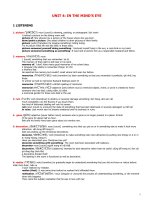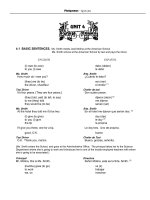UNIT 4 VOCAB + EXERCISES e8
Bạn đang xem bản rút gọn của tài liệu. Xem và tải ngay bản đầy đủ của tài liệu tại đây (59.67 KB, 4 trang )
Unit 4: Our customs and traditions
Teacher: Bùi Thị Thanh Mến
UNIT 4. OUR CUSTOMS AND TRADITIONS - PHONG TỤC VÀ TRUYỀN THỐNG
CỦA CHÚNG TA
I. New words:
1. accept /əkˈsept/ (v) : chấp nhận, nhận
2. break with /breɪk wɪð/ (v) : không theo
3. clockwise /ˈklɒkwaɪz/ (adv) : theo chiều kim đồng hồ
4. compliment /ˈkɒmplɪmənt/ (n) : lời khen
5. course /kɔːs/ (n) : món ăn
6. cutlery /ˈkʌtləri/ (n) : bộ đồ ăn (gồm thìa, dĩa, dao)
7. filmstrip /ˈfɪlmstrɪp/ (n): đoạn phim
8. host /həʊst/ (n) : chủ nhà (nam)
9. hostess /ˈhəʊstəs/ (n) : chủ nhà (nữ)
10. generation /ˌdʒenəˈreɪʃn/ (n) : thế hệ
11. offspring /ˈɒfsprɪŋ/ (n) : con cái
12. oblige /əˈblaɪdʒ/ (v) : bắt buộc
13. palm /pɑːm/ (n) : lòng bàn tay
14. pass down /pɑːs daʊn/ (v) : truyền cho
15. prong /prɒŋ/ (n) : đầu dĩa (phần có răng)
16. reflect /rɪˈflekt/ (v) : phản ánh
17. sharp /ʃɑːp/ (adv) : chính xác, đúng
18. sense of belonging /sens əv bɪˈlɒŋɪŋ/ (n) : cảm giác thân thuộc
19. social /ˈsəʊʃl/ (adj) : thuộc về xã hội
20. spot on /spɒt ɒn/ (adj, informal) : chính xác
21. spray /spreɪ/ (v) : xịt
22. spread /spred/ (v) : lan truyền
23. table manners /ˈteɪbl ˈmænə (r)/ (n, plural) : quy tắc ăn uống trong bàn ăn, phép tắc ăn uống
24. tip /tɪp/ (n, v) : tiền boa, boa
25. unity /ˈjuːnəti/ (n) : sự thống nhất, đoàn kết
26. upwards /ˈʌpwədz/ (adv) : hướng lên trên
27. You’re kidding! /jʊə kɪdɪŋ/ (idiom) : Bạn nói đùa thế thơi!, Đùa thơi mà!
28. conical hat /kɒnɪkl hỉt/ (n): nón lá
29. honor /’ɒnər/(v): thể hiện sự tơn trọng
30. manner /’mỉnər/(n): cách ứng xử
31. mat /mæt/(n): cái chiếu
32. respect /riˈspekt/(n, v): sự tơn trọng, tơn trọng
33. reunite /ri:ju:’naɪ/(v): đồn tụ
34. spirit /’spɪrɪt/ (n): tinh thần
35. tray /treɪ/(n): cái mâm
II. Exercises:
Ex1. Choose the word which has a different sound in the part underlined.
1. A. sound
B. touch
C. down
D. account
2. A. design
B. preserve
C. basic
D. physical
3. A. occupation
B. occasion
C. shake
D. miraculous
4. A. concerned
B. received
C. attached
D. concealed
5. A. teacher
B. clear
C. reason
D. mean
6. A. letter
B. twelve
C. person
D. sentence
7. A. included
B. received
C. remembered
D. annoyed
1
Unit 4: Our customs and traditions
Teacher: Bùi Thị Thanh Mến
8. A. enough
B. young
C. country
D. mountain
9. A. speech
B. March
C. machine
D. children
10. A. face
B. commercial
C. center
D. city
Ex2. Complete the sentences with a form of “have to” or “should”. Make the verbs negative
when necessary.
1. You
come with me if you don’t want to. I’ll go on my own.
2. If you need some help with your homework, you
go to the library.
3. If you have a ticket, you
queue. You can go straight in.
4. You
tell lies. It’s wrong.
5. Nick works too much. I think he
take it easy.
6. Your hair’s too long. I think you
get it cut.
7. Your clothes are dirty. You
wash them.
8. I’m going to bed. I
get up early tomorrow.
9. I’d like to meet your best friend. You
invite him/ her round.
10. I
tell my parents where I am, then they don’t worry.
Ex3. Choose the best answer A, B, C or D.
1. My parents usually ............................. work very early.
A. go to
B. going to
C. went
D. to go
2. There is a computer ............................. the middle ............................. the room.
A. in / of
B. in / in
C. on / of
D. on / in
3. Nam has to leave to tidy his room every day.
A. should
B. must
C. ought to
D. need to
4. Nga ............................. have a holiday in Da Lat next summer.
A. is going
B. will to
C. are going to
D. is going to
5. Lan isn’t ............................. to go to school today.
A. enough well
B. enough good
C. well enough
D. good enough
6. Boys and girls, you’ll have to do this experiment ............................. this afternoon.
A. youself
B. yourselves
C. yourself
D. youselves
7. We must put all the small objects such as beads out ............................. children’s reach.
A. of
B. in
C. on
D. to
8. You are too thin. You ............................. eat much more meat.
A. ought
B. ought not
C. ought to
D. ought not to
9. I and my pen friend ............................. Ho Chi Minh’s Mausoleum last Sunday.
A. visit
B. visited
C. visits
D. visiting
10. Let us ............................. to the school’s library next Monday.
A. going
B. to go
C. to going
D. go
11. Peter doesn’t talk much in public. He’s rather .............................
A. kind
B. sociable
C. humorous
D. reserved
12. You must not let children play in the street because it is .............................
A. suitable
B. dangerous
C. safe
D. careful
13. He’ll come ............................. to pick you .............................
A. over / up
B. over / on
C. in / up
D. on / in
14. The sun always ............................. in the East and ............................. in the West.
A. rise/ set
B. rises/ set
C. rises/ sets
D. has risen/ set
15. He spends most of his time ............................. charity work.
A. to do
B. did
C. doing
D. with doing
1. The wai is the traditional
of people in Thailand.
2
Unit 4: Our customs and traditions
Teacher: Bùi Thị Thanh Mến
A. greeting
B. hello
C. goodbye
D. greetings
2. When two Maori people meet, they
each other’s noses.
A. take
B. feel
C. touch
D. kiss
3. Do you know the
way to welcome people in Tibet?
A. custom
B. customer
C. customary
D. tradition
4. The xoe dance is a spiritual
of Thai ethnic people.
A. customs
B. tradition
C. habit
D. dance
5. In Viet Nam you shouldn’t use only the first name to
people older than you.
A. address
B. talk
C. say
D. speak
6. We are going to prepare
sticky rice served with grilled chicken for the
celebration.
A. five-coloured
B. five-colours
C. five-colour
D. five colours
7. A tradition is something special that is
through the generations.
A. passed
B. passed to
C. passed down
D. passed out
8. According to the
in England, we have to use a knife and folk at dinner.
A. table ways
B. table manners
C. behaviours
D. differences
9. We have to
our shoes when we go inside a pagoda.
A. put on
B. give off
C. turn off
D. take off
10. In Australia, you shouldn’t
on a person’s accent.
A. dislike
B. criticize
C. hate
D. comment
Ex4. Complete the sentences with the words:
custom / tradition / sharp / table manners / cutlery / prong / generation / sense of belonging /
host / spot on
1. Your ___________ are awful - don’t you know how to use a knife and fork?
2. The major items of ___________ in Western dining style are the knife, fork and spoon.
3. The extended family generally consists of at least three ___________ – grandparents, parents
and children living together.
4. The ___________ will offer you drinks or foods if he invites you to his home.
5. It’s the ___________ in Japan to take your shoes off when you go into someone’s house.
6. The weather forecast was ___________ – it rained all day!
7. Are you sure that other people have had a ___________ in your group?
8. My extended family has a ___________ of having reunions every summer.
9. You shouldn’t point the ___________ of the fork upwards during the meal.
10. Please be here at seven o’clock ___________.
Ex5. Supply the correct tense and form of the verbs in brackets.
1. Last week, we ____________(have) dinner with a French family.
2. I hate eating with spoon because it ____________ (cause) trouble when I eat fish.
3. In the past, ao dai ____________ (wear) by both men and women.
4. The speaker ______ (give) a presentation on Vietnamese customs and traditions right now.
5. She ____________ (travel) to six countries since she ____________ (start) the job.
6. Our family __________ (have) dinner together every Saturday night. It’s our family tradition.
7. I hope I ____________ (have) a chance to visit your country soon.
8. When in Japan, you should avoid
____________ (eat) on the go.
9. I think you should ____________ (go) to the doctor. You look terrible.
10. The Japanese tend ____________ (use) their mobile phones discreetly when in public.
Ex6. Choose the correct word for each blank in the following passage.
3
Unit 4: Our customs and traditions
Teacher: Bùi Thị Thanh Mến
Spring is a time when there are many festivals in our country. Among them, Hoa Ban
Festival is the most beautiful and interesting and it takes place in Lai Chau. It is typical of the (1)
………life of the Thai people. In the second lunar month of the year, when it (2) ……..warmer
and hoa ban - a kind of beautiful flower in the northwest mountainous area - blossoms, Hoa Ban
Festival is (3)………... This is a great time for everyone, (4) …………… for boys and girls. The
boy (4)………… the most beautiful flower and gives it to his girlfriend. This is not only a time
for love but also for the Thai people to (5)………..for good crops, for happiness, and express
their special thanks to the Gods and (6) …………... The festival is always full of songs and
prayers.
1. A .minor
B. cultural
C. custom
D. festival
2. A. gets
B. goes
C. comes
D. runs
3. A. seen
B. arranged
C. observed
D. celebrated
4. A. largely
B. especially
C. generally
D. typically
5. A. ask
B. look
C. pray
D. call
6. A. fathers
B. relatives
C. families
D. ancestor
Ex7. Read and complete the passage with words in the box.
celebrate
traditional
therefore
served
Tet is the biggest festival in Vietnam. To (1) ……………..Tet, Vietnamese people make
many tasty (2)……..….foods. The most important food includes Chung cakes, sausages, boiled
chicken, spring rolls, and sticky rice. Chung cake is made of sticky rice, pork, green beans, and
other spices, wrapped in green leaves; (3)…….….., this cake needs a lot of preparation . This
cake can be kept for a long time, even though the weather is often humid during Tet. Other
significant foods that cannot be missed to worship the ancestors are sausages, spring rolls, and
sticky rice. Because sausages are difficult to make, people often buy them from famous suppliers.
However, sticky rice and spring rolls are easier to prepare and must be (4)………..immediately
after they are cooked, so they are often made at home.
Ex8. Combine each pair of sentences to make one sentence, using the words given in
brackets.
1. Lang Lieu couldn’t buy any special food. He was very poor. (BECAUSE)
…………………………………………………………………………………………..…..…
2. During Tet, Vietnamese people buy all kinds of sweets. They make Chung cakes as well. (SO)
…………………………………………………………………………………………..…..…
3. The Hung King Temple Festival was a local festival. It has become a public holiday in Viet
Nam since 2007. (HOWEVER)
…………………………………………………………………………………………..…..…
4. At the Mid-Autumn Festival, kids can sing, dance, and enjoy moon-cakes. Every child likes it
very much. (THEREFORE)
…………………………………………………………………………………………..…..…
5. The buffalo-fighting Festival sounds frightening. Many people come to enjoy it.
(ALTHOUGH)
…………………………………………………………………………………………………..
6. The Hung King Temple Festival was a local festival. It has become a public holiday in Vietnam
since 2007. (NEVERTHELESS)
…………………………………………………………………………………………………..
4









